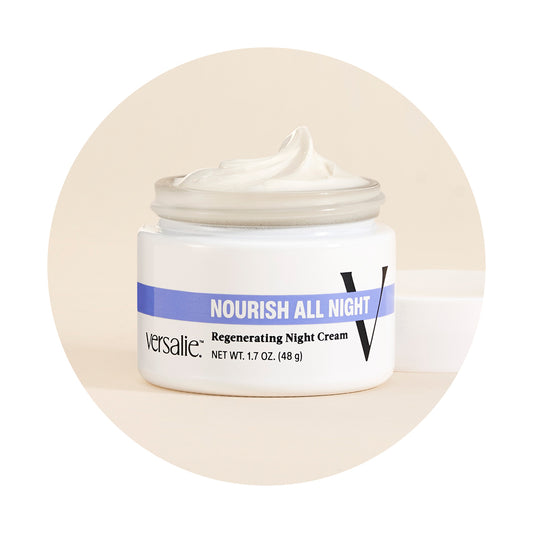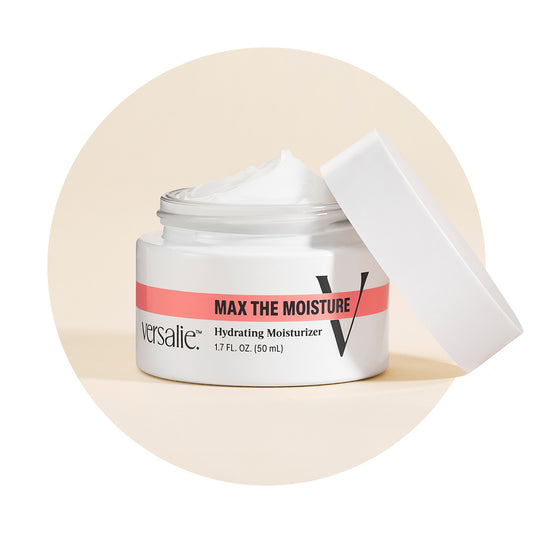If you’ve asked yourself this question, you’re not alone. Some of our own, Dawn & Naomi, have asked themselves the same question as they've navigated perimenopause and menopause.
What are ‘normal’ period changes during perimenopause?
There’s no “one-size fits all” for changes in your period during perimenopause. However, studies over the past 20 years have given more information about what to expect and help you figure out where you might be in the menopause transition.
- Early transition. 6-8 years before the final menstrual period, you may see a persistent change in the length of a cycle of 7 days or more. Cycles might also be shorter to around 21 days.
- Late transition. About 2 years before your final period, you’ll start to see cycles spread out and can go 60+ days before periods. The longer the time between your periods, the closer you are to menopause.
While this can be helpful for some, unfortunately, it won’t apply to everyone. There have been several studies showing how different it can be. Some people (about 15-25%) don’t have any change in their cycle, but it’ll just stop one day. And for others, they may notice some irregularity for years before their final period. In addition, there are other factors that can affect the patterns of periods:
- Ethnicity
- Body size
- Medical conditions
- Cigarette smoking
What about if I haven’t had a period for years?
The definition of menopause is not having a period for 12 consecutive months. It’s a simple, but helpful definition. BUT it won’t always apply to everyone. There are many folks who haven’t hit that 12-month mark (aka, menopause), but they don’t get a monthly period (and may not have for some time).
While this list isn’t large, there are several reasons you may not get a period (even if you haven’t hit menopause yet). Some of the common reasons for that include hysterectomy, IUDs, and uterine ablations.
 Does a hysterectomy cause menopause?
Does a hysterectomy cause menopause?
After a hysterectomy, the impact on menopause can vary depending on whether the ovaries were also removed. As a reminder, the most common types of hysterectomy are:
- Total hysterectomy. This is the most common type of hysterectomy. The uterus and cervix are removed. The fallopian tubes are often removed, and the ovaries may or may not be removed.
- Supracervical (also referred to as subtotal or partial) hysterectomy. Just the upper part (the body) of the uterus is removed, and the cervix is left in place. The fallopian tubes are often removed, and the ovaries may or may not be removed.
As you can see, both types of hysterectomy may or may not include the removal of the ovaries. Most hysterectomies done for benign reasons on pre-menopausal people leave the ovaries behind so they can continue to provide hormone support to the body.
If you want to read more about menopause and hysterectomies, check out this article.
Everyone who has a hysterectomy will stop getting their period. This is because menstruation (aka, your period) is your body shedding the endometrial lining (the lining inside of the uterus) each month if a fertilized egg doesn’t implant into the uterine wall and form a pregnancy. When you no longer have a uterus, because of a hysterectomy, you can’t have a period because there isn’t a lining to shed.
If you keep your ovaries, you may not notice any menopause symptoms right away. That's because the ovaries are still releasing hormones. They don’t need the uterus to continue to cycle and produce hormones.
 But your progression into menopause may also not be the same as if you didn’t have a hysterectomy. Some premenopausal people may experience hot flashes after a hysterectomy due to decreased blood flow to the ovaries. You may also start natural menopause earlier than you would have if you didn't have a hysterectomy. This means you could have menopause symptoms a few years earlier than you otherwise may have.
But your progression into menopause may also not be the same as if you didn’t have a hysterectomy. Some premenopausal people may experience hot flashes after a hysterectomy due to decreased blood flow to the ovaries. You may also start natural menopause earlier than you would have if you didn't have a hysterectomy. This means you could have menopause symptoms a few years earlier than you otherwise may have.
If your ovaries are removed as part of a hysterectomy, you won't get a period anymore. You may also start having menopause symptoms right away, no matter how old you are. This type of menopause is also called surgical or induced menopause. The symptoms of menopause may come on suddenly and be very intense. This is because your body stops getting hormones from the ovaries all at once, instead of the levels going down slowly over many years.
Hormonal IUD and bleeding
Hormonal intrauterine devices (IUDs) are prescribed as a form of long-acting reversible contraception and to help manage menstrual cycles or abnormal bleeding. They are a T-shaped device that a medical provider places in the uterus. Depending on the one you receive, they’re approved to be used anywhere from 3-8 years.
They’re one of the most effective forms of contraception today with a failure rate of only 0.02%. Higher-dose IUDs can also be used to protect your endometrium (uterine lining) if you’re taking menopause hormone therapy (MHT). To understand all the risks and benefits of an IUD, talk to your healthcare provider.
About 20% of people using a hormonal IUD will stop having periods after the first year of use. For those who still get a period, 80% see a reduction in bleeding after 3 months. After 6 months of use, over 90% see a reduction in bleeding. Not getting a period is one of the most common side effects of that type of birth control.
It’s a safe and effective birth control method, especially if you want to avoid pregnancy in your 40s. It’s completely safe to not have a period while using a hormonal IUD because it’s keeping the uterine lining stable and thin. But not having periods may make it hard to know where you are in the menopause transition.
Using the IUD won't affect when menopause beings. If you aren't bleeding each month because of the IUD, talk to your doctor about your symptoms and if and when to remove the IUD. There are other ways to sort out your menopause stage with your clinician and treat symptoms effectively if needed.
 What to expect after uterine ablation
What to expect after uterine ablation
Another potential reason for not having a period as you enter the menopause transition is an endometrial ablation, also sometimes called a uterine ablation. It’s a procedure that removes or destroys a thin layer of the uterine lining (endometrium) to help treat abnormal heavy bleeding that significantly impacts someone’s quality of life.
It can be a good option for those who have finished having children and are perimenopausal. For those approaching or experiencing menopause, endometrial ablation can be an appealing option to help manage their symptoms and improve their quality of life.
Many people at this stage of life may already be experiencing irregular or heavy menstrual bleeding because of hormonal changes associated with perimenopause. Endometrial ablation can help with bleeding that’s hard to control. It can also improve a person’s quality of life and reduce the need for other medical interventions.
For some people, they may experience light periods or no periods at all a few weeks after the procedure. While this procedure can significantly reduce the amount of bleeding, it doesn’t cause immediate menopause. It may temporarily reduce or stop menstrual bleeding, but it doesn’t affect the natural progression of menopause.
Remember that menopause is a complex hormonal transition directed by the ovaries that affects the entire body, not just the uterus. Symptoms such as hot flashes, night sweats, mood swings, and vaginal dryness may still occur even after endometrial ablation.

So, what do I do if I’m not getting a period?
If you're not sure exactly where you are in the transition, that's totally okay! Whether you're in perimenopause, menopause, or postmenopause, what matters the most is how you feel and managing whatever symptoms you may be experiencing so you can have the best quality of life.
Versalie Advisor and OB-GYN, Dr. Jill Liss, has some great advice on how to navigate not knowing:
“I like to think of menopause as a transition, not a static event. It’s a journey that unfolds differently for each person. While it’s natural to want to know exactly where you are on this path, the most important thing is to pay attention to how you’re feeling. How you’re feeling gives us a lot of the information we need to understand your transition. Rather than pinpointing the precise moment in the process, the priority should be to manage and address your symptoms. Your doctor can guide you based on your age and experiences, ensuring you get the support you need, regardless of where you are on the timeline.”
The reasons we may not be getting a period could also be the same as the reasons some people don't get periods before menopause. As a refresher, those reasons can include:
- Very low or very high levels of body fat.
- Severe anxiety/stress.
- Rapid weight loss.
- Exercising too much or for long periods of time.
- Pregnancy.
- Health conditions like PCOS, hypothyroidism, hyperthyroidism, celiac disease, or diabetes.









